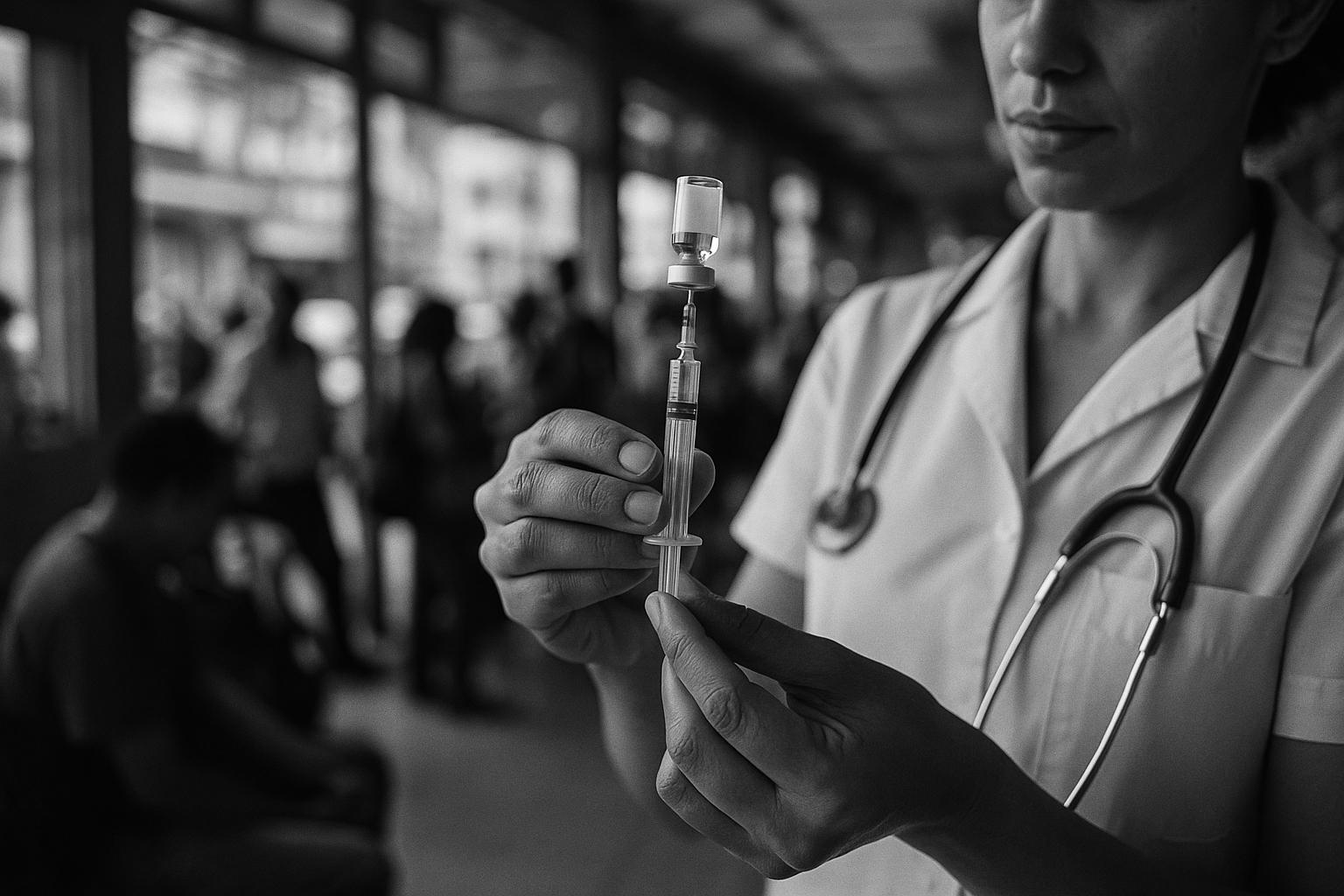Parents across the UK are being strongly urged to vaccinate their children against measles during the summer holidays, amid growing concerns over a resurgence of cases that could escalate further with increased summer travel. British health officials have reported a notable spike in measles infections this year, with the total reaching 674 cases since the start of January, a figure that has raised alarms particularly in regions such as London and the North West. This resurgence follows last year's highest annual infection numbers since 2012, underscoring a troubling upward trend in what is widely regarded as one of the world’s most infectious diseases.
Measles, a disease known for causing flu-like symptoms followed by a characteristic rash, can lead to severe complications including hearing loss, meningitis, pneumonia, and even death. Tragically, a child in Liverpool recently died amid severe measles infection combined with other serious health conditions. Health experts highlight that two doses of the measles, mumps, and rubella (MMR) vaccine provide up to 99% protection. Yet, vaccination coverage remains uneven and alarmingly low in parts of England. For instance, areas such as Hackney in East London have seen MMR coverage as low as 60.8% among five-year-olds, substantially below the 83.9% average for England and far from the 95% herd immunity threshold recommended by the World Health Organization (WHO). Similar low vaccination rates are reported in Liverpool, Manchester, and Birmingham.
Public health authorities warn that this patchy immunisation landscape leaves children vulnerable, with the virus capable of spreading to nine out of ten unvaccinated individuals nearby. The UK Health Security Agency (UKHSA) has recorded that nearly half of the cases this year have appeared in London, with 79 cases in Hackney alone, representing over 10% of the national total. Dr Ben Kasstan-Dabush of the London School of Hygiene & Tropical Medicine has described Hackney's unique population demographics, including a high proportion of young residents, as factors complicating vaccination efforts. Funding inconsistencies and short-term commissioning of vaccination programmes further challenge efforts to significantly improve coverage in such areas.
Experts emphasise that the summer months present a crucial window for parents to update their children’s vaccinations before the school year begins, to shield them from outbreaks. Dr Vanessa Saliba, a UKHSA consultant epidemiologist, underscored that it is never too late for catch-up immunisations, especially as vulnerable groups like infants under one year old and immunocompromised individuals rely on herd immunity to stay protected from serious complications.
The current predicament in the UK mirrors a wider regional and global trend. According to the World Health Organization (WHO) and UNICEF, measles cases in Europe and Central Asia have surged to levels not seen since 1997, more than doubling from approximately 61,000 cases in 2023 to nearly 149,000 in 2024. This alarming rise is linked to a failure to restore vaccination coverage to pre-pandemic levels, with MMR vaccine uptake dropping to around 91%—well below the requisite 95% for herd immunity. Vaccine complacency and misinformation, exacerbated by the absence of recent widespread experience of serious vaccine-preventable diseases, have contributed heavily to this decline. Influential figures such as Robert F. Kennedy Jr., who briefly questioned vaccine safety before endorsing MMR vaccination amid surging US measles cases, have added complexity to public perceptions of vaccine safety.
The UK’s National Health Service (NHS) has responded with campaigns aimed at reversing declining vaccine uptake, which has fallen to a 14-year low for the MMR vaccine, with only about 85% of children in England receiving the required two doses. This figure is significantly under the WHO target and leaves millions of children either unprotected or only partially protected. Health officials are combating persistent misinformation and the lingering impact of discredited claims linking vaccines to autism, a controversy that dramatically reduced uptake in the late 1990s and early 2000s following Andrew Wakefield’s now-debunked study.
Senior health authorities in the UK are calling for urgent government action, particularly increased funding and support for frontline health services like nursing and community vaccination programmes. Flexibility in vaccine appointment options and community outreach are central pillars of the NHS’s strategy to bolster immunisation figures and protect children from preventable diseases. As measles remains highly contagious and potentially deadly, ensuring high vaccine coverage is critical for public health.
Moreover, the issue of booster vaccinations is gaining attention, especially in light of immune amnesia caused by measles, where the virus erases crucial components of immune memory, potentially leaving individuals vulnerable to other infections. Healthcare experts recommend that adults, particularly those vaccinated before 1968 or with compromised immune systems, consider booster doses after verifying their immunity status through accessible testing.
In summary, the UK faces a pressing public health challenge as measles cases rise amid insufficient vaccination coverage. The convergence of regional disparities, misinformation, and post-pandemic complacency demands coordinated efforts between government agencies, healthcare providers, and communities to protect vulnerable populations and prevent further tragedy.
📌 Reference Map:
- Paragraph 1 – [1], [4]
- Paragraph 2 – [1], [3], [5]
- Paragraph 3 – [1], [5], [4]
- Paragraph 4 – [1], [3], [4], [5]
- Paragraph 5 – [2], [6]
- Paragraph 6 – [3], [4], [5]
- Paragraph 7 – [1], [7]
- Paragraph 8 – [1], [2], [3], [4], [5], [7]
Source: Noah Wire Services
